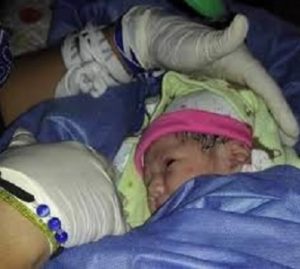Three months of violent crackdowns against anti-government protestors have put Nicaragua’s evangelical Christians in a precarious place, according to e-mails from a Baptist in the country forwarded by an American friend requesting anonymity.
About 400 people have died in just over 100 days since protests of President Daniel Ortega’s proposal to reform the nation’s ailing social security system turned to demands that the leader of the 1979 Sandinista revolution that overthrew U.S.-backed dictator Antonio Somoza step down for violations of human rights similar to those of his predecessor.
Sources say Ortega, 72, invited leaders of the Roman Catholic Church to mediate talks between the government and protestors. When bishops began to intervene to protect protestors, however, the president, who identifies as a Catholic, turned on them, accusing them of plotting a coup.

Photo of a baby born at a roadblock in Carazo, Nicaragua, published online by the Havana Times.
Forces supportive of Ortega have vandalized churches and shot at protesters who sought sanctuary inside them. Vice President Mike Pence accused Ortega of “virtually waging war on the Catholic Church” in a speech at this week’s Ministerial To Advance Religious Freedom held at the U.S. State Department.
The terror has also taken toll on Nicaragua’s comparatively small but growing evangelical minority, traditionally less politically inclined than the dominant religion, Catholicism. Victims include an evangelical pastor, his wife and four other family members murdered in June after refusing to let a pro-government paramilitary group use their third floor as a platform for snipers to shoot against a planned demonstration in the neighborhood.
The Nicaraguan Evangelical Alliance released a statement July 10 denouncing the lack of security and asking international organizations to act “with greater belligerence so that the State of Nicaragua through its government, will respect human rights and stop the repression and death of the people.”
“There are times when I think this cannot be happening, that it is some type of surreal nightmare,” an unnamed Baptist described the scene in a compilation of e-mails forwarded to Baptist News Global. The American who compiled the e-mails also requested anonymity, fearing retaliation against the Nicaraguan friend.
“Then the sound of mortars brings me back to reality,” the missive continued. “But somehow, deep down, we feel we are being part of something big. We are part of a pacifist revolution against a failed armed revolution.”
The individual’s church has launched a ministry to provide crisis intervention to families on both sides of the conflict who have lost family members or been wounded, tortured or disappeared.
With no end to the violence in sight, observers describe Nicaragua, until recently one of the more stable states in the region, as on the brink of civil war.
ACT Forum Nicaragua, a group of faith-based organizations promoting peace and justice, repudiated the ongoing violence and called for “support and solidarity from the international ecumenical family.”
The head of the World Council of Churches called on the government “to cease the appalling violence and to protect the population” and described the current level of state repression as “unacceptable.”
“We have a long way ahead of us; it is not easy to reconstruct a society that has been hurt to its very core,” the Nicaraguan Baptist described the scene. “There will be a great need for healing, within families and across the nation.”
In the meantime peace-loving Nicaraguans are finding hope in small things such as the story of a baby born in the street because barricades prevented her mother from reaching the hospital in time. The 29-year-old mother named the child Liberty and improvised a baby blanket by swaddling the infant in the Nicaraguan flag.
“The birth of this baby moved many people,” the Nicaraguan Baptist reported in June. “For once there was not death at a barricade, there was life! May God allow this baby to grow up in a new Nicaragua, where there will be no more repression and violence, but where peace and justice will reign.”
